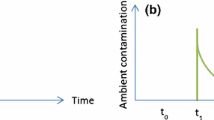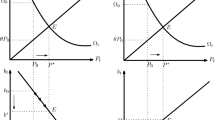Abstract
In a standard static setup, optimal environmental taxes are increasing in expected pollution damage. With irreversible investments and new information about environmental damage becoming available over time, we show that this result also holds if damage in the high-damage scenario rises or the probability of high damage increases. However, if damage in the low-damage scenario increases, current environmental taxes should decrease if firms face sufficiently similar abatement costs.
Similar content being viewed by others
References
K. J. Arrow A. C. Fisher (1974) ArticleTitleEnvironmental Preservation, Uncertainty, and Irreversibility Quarterly Journal of Economics 88 312–319 Occurrence Handle10.2307/1883074
A. K. Dixit R. S. Pindyck (1994) Investment under Uncertainty Princeton University Press Princeton
H. Gersbach A. Glazer (1999) ArticleTitleMarkets and Regulatory Hold-up Problems Journal of Environmental Economics and Management 37 151–164 Occurrence Handle10.1006/jeem.1998.1063
W. M. Hanemann (1989) ArticleTitleInformation and the Concept of Option Value Journal of Environmental Economics and Management 16 23–37 Occurrence Handle10.1016/0095-0696(89)90042-9
P. W. Kennedy (1999) ArticleTitleLearning about Environmental Damage: Implications for Emissions Trading Canadian Journal of Economics 32 1313–1327 Occurrence Handle10.2307/136484
P. W. Kennedy B. Laplante (1999) Environmental Policy and Time Consistency: Emission Taxes and Emissions Trading E. Petrakis E. S. Sartzetakis A. Xepapadeas (Eds) Environmental Regulation and Market Power: Competition, Time Consistency and International Trade Edward Elgar Cheltenham 116–144
C. D. Kolstad (1996) ArticleTitleLearning and Stock Effects in Environmental Regulation: The Case of Greenhouse Gas Emissions Journal of Environmental Economics and Management 31 1–18 Occurrence Handle10.1006/jeem.1996.0028
E. Petrakis (1999) Diffusion of Abatement Technologies in a Differentiated Industry E. Petrakis E. S. Sartzetakis A. Xepapadeas (Eds) Environmental Regulation and Market Power: Competition, Time Consistency and International Trade Edward Elgar Cheltenham 162–174
R. S. Pindyck (1988) ArticleTitleIrreversible Investment, Capacity Choice, and the Value of the Firm American Economic Review 79 969–985
R. S. Pindyck (2000) ArticleTitleIrreversibility and the Timing of Environmental Policy Resource and Energy Economics 22 233–259 Occurrence Handle10.1016/S0928-7655(00)00033-6
T. Requate (1995) ArticleTitleIncentives to Adopt Technologies under Different Pollution-control Policies International Tax and Public Finance 2 295–317 Occurrence Handle10.1007/BF00877503
T. Requate (1998) ArticleTitleIncentives to Innovate under Emission Taxes and Tradeable Permits European Journal of Political Economy 14 139–165 Occurrence Handle10.1016/S0176-2680(97)00048-7
T. Requate W. Unold (1999) ArticleTitleOn the Incentives of Environmental Policy Instruments to Adopt Advanced Abatement Technology if Firms Are Asymmetric Journal of Institutional and Theoretical Economics 157 536–554 Occurrence Handle10.1628/0932456012974468
T. Requate W. Unold (2003) ArticleTitleEnvironmental Policy Incentives to Adopt Advanced Abatement Technology: Will the True Ranking Please Stand Up? European Economic Review 47 125–146 Occurrence Handle10.1016/S0014-2921(02)00188-5
Author information
Authors and Affiliations
Corresponding author
Rights and permissions
About this article
Cite this article
Dijkstra, B.R., van Soest, D.P. Higher Pollution Damage, More Lenient Environmental Policies?. J Econ 89, 267–284 (2006). https://doi.org/10.1007/s00712-006-0223-5
Received:
Revised:
Published:
Issue Date:
DOI: https://doi.org/10.1007/s00712-006-0223-5




